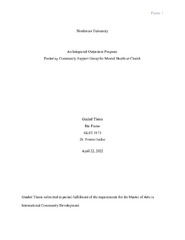Life and Lived Experiences of Adults With Chronic Mental Illness
View/
Date
July 22, 2021Author
Gallo, Chance D.
Advisor
Edstrom, Leihua
Metadata
Show full item recordAbstract
Chronic mental illnesses such as schizophrenia or bipolar disorders can have lasting impacts and challenges for those who live with them. These challenges consist of routine difficulty, structured support, and how this population seeks out treatment (Conway et al., 2019). The rationale of this study was to understand how adults with chronic mental illness perceive treatment based on their lived experiences and what changes can be made to the field of behavioral health. This study used a phenomenological methodology to provide greater understanding and meaning of participants' treatment experiences. This study recruited seven participants from an outpatient psychiatric organization to participate in an interview. Interview questions were constructed to understand how this vulnerable population relates to their mental health treatment, what their experiences have been with treatment, and what changes can be made to the field of behavioral health based on their lived experiences. Interview transcripts were coded using the ATLAS.ti software program to support the organization of the coding schemas. These schemas were then used to express themes and subthemes that addressed the research questions. Interrater reliability was established by computing a Cohen's weighted kappa on a portion of the transcripts to assess consistency of coding. Themes were identified from participants who described a variety of experiences that comprised of effective and ineffective methods of care. Specific areas of effective care consisted of validation of participants' lived experiences and collaboration between providers for care. Ineffective care methods were being dehumanized/stigmatized based on diagnosis and a lack of education around diagnoses. Study limitations were a lack of diversity in diagnoses and a smaller number of participants in the study. This study yielded research implications such as understanding treatment perceptions of inpatient psychiatric care compared to outpatient care. Specific policies such as educating practitioners to use person-centered language around a diagnosis may create a more welcoming environment for treatment. For instance, rather than stating schizophrenic, identify the person by their name or this person who has or lives with schizophrenia (American Psychological Association, 2020). These adaptations may assist in treating adults with chronic mental illness and reinforce higher levels of confidence to seek mental health treatment. In addition, these changes may strengthen familial and community supports for adults with chronic mental illnesses.
Original item type
PDF
Original extent
93 pages
Collections
Copyright
This original work is protected by copyright. Copyright is retained by the author(s). Works may be viewed, downloaded, or printed, but not reproduced or distributed without author(s) permission.
Related items
Showing items related by title, author, creator and subject.
-
Life and Lived Experiences of Adults With Chronic Mental Illness
Gallo, Chance
Northwest University, 2022
93 pagesChronic mental illnesses such as schizophrenia or bipolar disorders can have lasting impacts and challenges for those who live with them. These challenges consist of routine difficulty, structured support, and how this ... -
An Integrated Outpatient Program: Fostering Community Support Group for Mental Health at Church
Fiamo, Bia
Northwest University, April 22, 2022
47 pages -
Mom's Mental Health: The Impact of Social Media Usage on Stress, Anxiety, and Depressive Traits in Mothers
Smith, Tessa V.R.
Northwest University, 2024
85 pagesBackground: Motherhood is a time of intense physical, psychological, and emotional demands. Comparison of parenting or just a need to escape the unrelenting demands may find a mother engaging in social media usage at high ...





 Maintained by the Northwest University Library
Maintained by the Northwest University Library